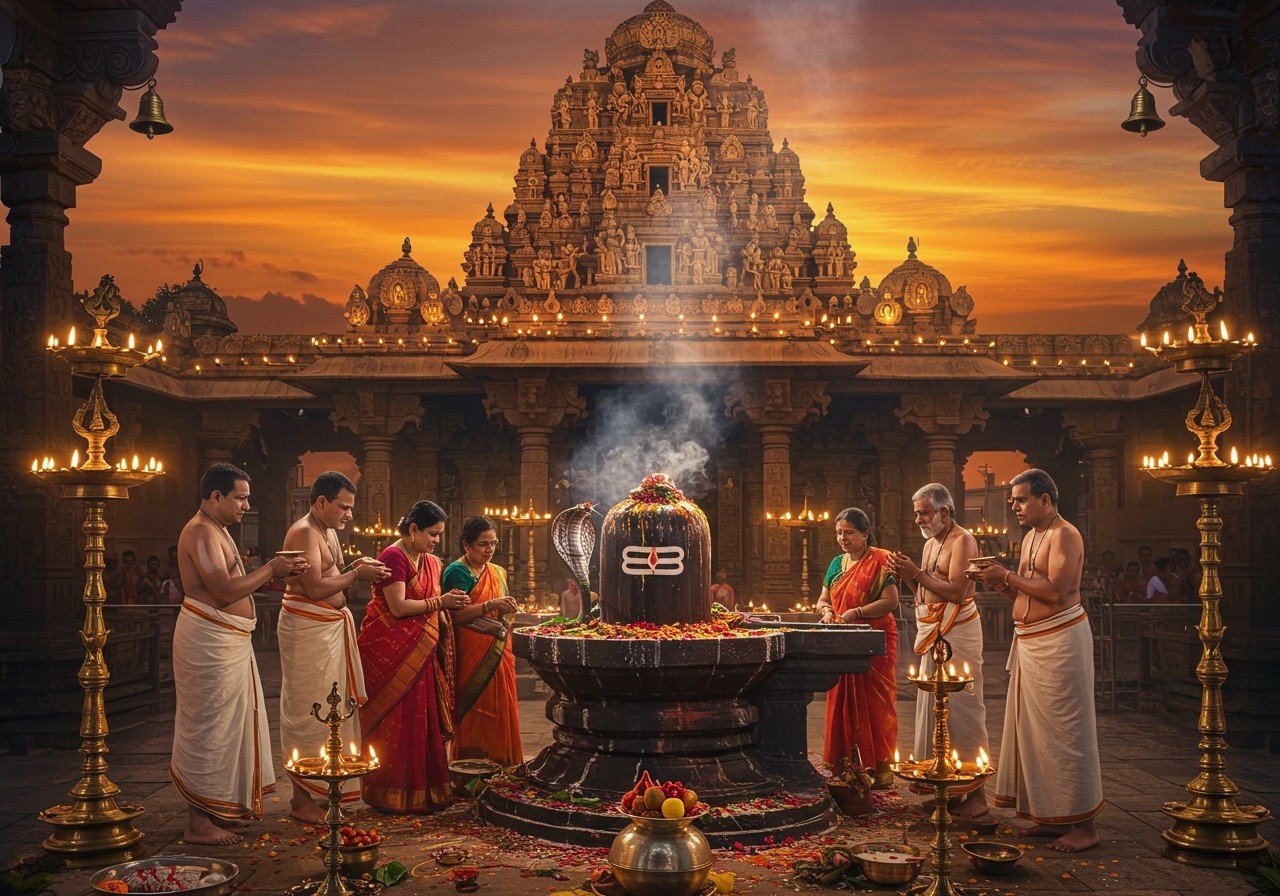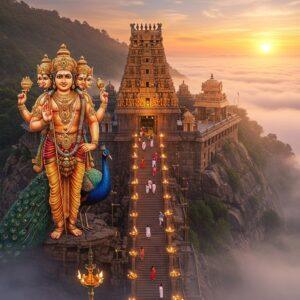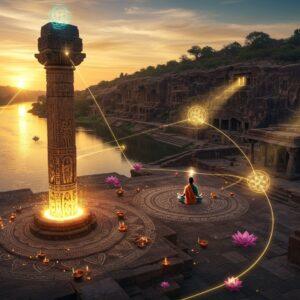
Dive into the rich tapestry of festivals and rituals dedicated to Lord Shiva, one of Hinduism’s most revered deities. These celebrations are woven into the fabric of India’s cultural and religious landscape, bringing communities together and passing down traditions through generations. Shiva temples become vibrant hubs during these festivals, drawing in people from all walks of life, especially those deeply rooted in Indian culture. And in today’s world, the convenience of online shopping brings authentic ritual items right to our doorsteps, making it easier than ever to honor these traditions with utmost sincerity.
A Journey Through Time: The Historical Significance of Shiva Temples
India’s Shiva temples stand as testaments to time, echoing with centuries of devotion and history. These sacred spaces, like the magnificent Kashi Vishwanath, the awe-inspiring Brihadeeswarar, and the legendary Somnath, are not just architectural marvels; they are living embodiments of our rich cultural heritage. Each temple, shaped by regional influences, whispers stories of the past. From the patronage of kings to the unwavering support of local communities, these temples have been nurtured and preserved. A pilgrimage to these sites is more than a journey; it’s a profound experience of spiritual and cultural immersion. Preserving these ancient wonders is a continuous effort, a sacred duty to safeguard our heritage for generations to come. You can learn more about the significance of Hindu temples in this informative blog post: Hindu Temples: Sacred Spaces and Their Significance.
Celebrating Shiva: The Heart of Temple Festivals
Within the hallowed walls of Shiva temples, every festival unfolds as a unique expression of reverence, steeped in rituals and profound spiritual meaning. Let’s explore some of these vibrant celebrations:
- Maha Shivaratri: A Night of Divine Union: This is the grandest of all Shiva festivals. Celebrated in February or March, devotees observe a night-long vigil, filling the temple with fervent prayers, meditative chants, and the glow of countless lamps. Maha Shivaratri commemorates the celestial union of Lord Shiva and Parvati, a symbol of divine love and cosmic balance. It also marks the powerful Tandava dance, a cosmic expression of creation and destruction. Learn more about the essentials and rituals for this auspicious night: Shiva Puja Essentials and Ritual Guide.
- Pradosh Vrat: Twice-Monthly Observance: Falling on the 13th day of every lunar fortnight, Pradosh Vrat is observed with fasting and dedicated worship. It’s believed that observing this vrat appeases Lord Shiva, bringing peace, prosperity, and spiritual growth. The atmosphere in Shiva temples during Pradosh Vrat is charged with devotion and hope.
- Shravan Maas: A Month of Devotion: The entire month of Shravan (July-August) is dedicated to Lord Shiva. Devotees throng to temples, offering prayers, observing fasts, and seeking blessings. This period signifies deep spiritual reflection and renewed faith.
- Kanwar Yatra: A Pilgrimage of Faith: During Shravan Maas, the Kanwar Yatra becomes a spectacle of devotion. Devotees, carrying sacred water from the Ganges River in ornate containers, embark on a pilgrimage to Shiva temples, their journey fueled by unwavering faith. This act of devotion transforms the landscape into a moving river of faith.
- Masik Shivaratri: Monthly Observance: Celebrated on the 14th night of the waning moon each month, Masik Shivaratri provides a regular opportunity for devotees to reconnect with the divine. It reinforces the spirit of Maha Shivaratri, emphasizing continuous devotion throughout the year.
- Chaturdashi: Fortnightly Dedication: The 14th day of every lunar fortnight, known as Chaturdashi, is also marked for Shiva worship. This recurring observance reinforces the continuous connection between devotees and the divine.
- Kartik Purnima: Full Moon Blessings: Falling in October or November, Kartik Purnima, celebrated on the full moon day, holds spiritual significance, often associated with cleansing and seeking divine blessings.
- Sawan Somvar: Mondays of Shravan: Mondays during Shravan Maas are particularly auspicious. Known as Sawan Somvar, these days are observed with special prayers and rituals, seeking Lord Shiva’s blessings for well-being and happiness.
- Aanayoottu: Feeding the Gentle Giants: This unique festival, especially prominent in Kerala, involves the ceremonial feeding of elephants within temple grounds, typically in July. It symbolizes respect for all living beings and is often associated with the Sree Wadakkunathan Temple. Learn more about this temple.
- Thrissur Pooram: A Spectacle of Festivities: While Thrissur Pooram is a grand temple festival in Kerala, Lord Shiva, residing in the Vadakkunnathan Temple, plays the role of a silent witness, a divine presence amidst the vibrant celebrations. Deities from other temples visit Vadakkunnathan, making it a unique confluence of traditions and devotion. You can find a comprehensive guide to this festival here: Ernakulam Shiva Temple: Your Complete Visit Guide.
These festivals are not monolithic; they are beautifully diverse. Regional variations add unique colors and flavors. For instance, at the Shree Ratneshwar Mahadev Temple in Karachi, Pakistan, Shivaratri is celebrated with devotees bringing holy water from the Ganges, a testament to their deep-rooted faith. Similarly, temples in Andhra Pradesh and Telangana perform unique pujas, highlighting the rich tapestry of regional traditions. Beyond their spiritual significance, these festivals invigorate local communities, attracting pilgrims and tourists, and strengthening the bonds of shared heritage.
Poojn.in: Your Companion for Shiva Temple Festivals and Rituals
At poojn.in, we understand the importance of having the right samagri for your spiritual practices. We offer a wide range of authentic puja items and services to support your observance of all major Shiva festivals and temple rituals. Here’s how we can help:
For Maha Shivaratri:
- Complete Puja Kits: Get everything you need in one convenient package. Our Maha Shivaratri puja samagri kits are thoughtfully assembled to ensure you have all the essentials.
- Copper Kalash Sets: Perform abhishekam with reverence using our pure copper kalash sets. They are crafted with care and designed for traditional rituals.
- Bel Patra and Dhatura: Source the freshest bel patra and dhatura, essential offerings for Lord Shiva.
- Rudraksha Malas: Enhance your spiritual practice with our premium quality rudraksha malas. These are carefully selected for their authenticity and purity. Shop Now
- Pure Ghee Wicks: Light your deepam with pure ghee cotton wicks for a traditional and auspicious flame.
For Shravan Maas:
- Puja Thalis: Simplify your preparations with our ready-to-use puja thalis. These are beautifully decorated and contain all the necessary components for your offerings. Explore our Durga Puja Dashakarma Kit
- Organic Bilva Leaves: Offer the purest devotion with our organically sourced bilva leaves. We ensure their freshness and quality.
- Copper Vessels for Jalabhishek: Perform jalabhishek with pure copper vessels, crafted specifically for this sacred ritual.
- Sacred Thread (Janeu): Find high-quality sacred threads (janeu) for your rituals and ceremonies.
- Natural Incense: Create a serene atmosphere with our natural incense sticks and dhoop.
For Regular Temple Rituals:
- Aarti Plates: Choose from our exquisite collection of brass and copper aarti plates, perfect for daily worship.
- Silver Items for Abhishekam: Elevate your rituals with pure silver items for abhishekam. These are not only beautiful but also hold symbolic significance.
- Panchamrit Ingredients: Prepare panchamrit with ease using our readily available ingredients, sourced for their quality and purity.
- Diya and Deepam Supplies: Find everything you need for lighting diyas and deepams, from wicks to oil.
- Authentic Rudraksha Beads: Enhance your spiritual practice with our authentic rudraksha beads, available in various mukhis (faces).
All our items are carefully sourced and checked for their suitability for temple use. We offer secure packaging and deliver across India to maintain the purity of your puja items. For personalized help or large orders for temples, reach out to us:
- Call: 03369029784
- WhatsApp: 9476142738
Visit poojn.in and discover our complete selection of Shiva puja items. We guarantee timely delivery and secure packaging to preserve the sanctity of your ritual items. You might also be interested in our Laddu Gopal Murti. or Maa Manasha Murti.
[Note: Product availability may vary. Please check our website for current stock and prices.]
The Eternal Spirit of Shiva: A Legacy of Devotion
In the heart of Shiva temples, each festival becomes a vibrant tapestry of devotion, tradition, and the spirit of community. From the mystical allure of Maha Shivaratri to the vibrant energy of Thrissur Pooram, these celebrations deepen our connection with Lord Shiva and the rich spiritual heritage of India. Devotees, united in their reverence, not only preserve ancient rituals but also breathe life into traditions that continue to flourish. The convenience of online shopping for authentic ritual items makes it easier than ever to participate in these sacred observances, ensuring that your celebrations are both meaningful and convenient. As you immerse yourself in the spiritual essence of Shiva temple festivals, you become a part of a living legacy, carrying forward the flame of devotion for generations to come, promising joy, peace, and spiritual fulfillment.
FAQs on Shiva Temple Festivals & Rituals
What are some well-known Shiva temple festivals? Maha Shivaratri, Pradosh Vrat, and the entire month of Shravan Maas are among the most celebrated festivals in Shiva temples. Each festival has its own unique rituals and significance, offering devotees various ways to connect with Lord Shiva.
Why is Maha Shivaratri celebrated? Maha Shivaratri marks the night of Lord Shiva’s cosmic dance, the Tandava. It’s a night of intense spiritual significance, with devotees fasting, praying, and seeking blessings for spiritual growth. This auspicious night is also believed to commemorate the marriage of Lord Shiva and Parvati.
What rituals are observed during Pradosh Vrat? Pradosh Vrat is a time for purification and devotion. Devotees perform Abhishekam, bathing the Shiva Lingam with sacred offerings like water, milk, and honey. This is followed by prayers and offerings, creating a powerful atmosphere of reverence.
What is the significance of Shravan Maas in Shiva temples? Shravan Maas is a holy month dedicated to Lord Shiva. Devotees visit temples, offer bilva leaves, a sacred offering to Lord Shiva, and observe fasts to seek His divine blessings throughout the month. This period is filled with intense spiritual practice and devotion.
What is the importance of bilva leaves in Shiva rituals? Bilva leaves hold a special significance in Shiva worship. Offering these leaves during prayers is believed to purify one’s karmas, remove obstacles, and bring peace and prosperity. The three-lobed leaf is often seen as a representation of the Trimurti – Brahma, Vishnu, and Mahesh (Shiva).
Why do devotees fast during Shiva festivals? Fasting during Shiva festivals is a way to cleanse the body and mind, demonstrating devotion and seeking blessings from Lord Shiva. This act of self-discipline is believed to enhance spiritual focus and bring one closer to the divine.
How do temples prepare for Shiva temple festivals? Shiva temples undergo a transformation during festivals. Decorated with vibrant flowers, shimmering lights, and colorful banners, they become beacons of celebration. Special pujas, rituals, and often cultural programs are organized, creating a festive atmosphere filled with devotion and joy.
Is there a dress code for visiting Shiva temples during festivals? While there’s no strict dress code, devotees usually opt for traditional attire out of respect for the sacred space. Men often wear dhotis or kurta-pajamas, while women wear sarees or salwar-kameez, adding to the atmosphere of reverence and tradition.


